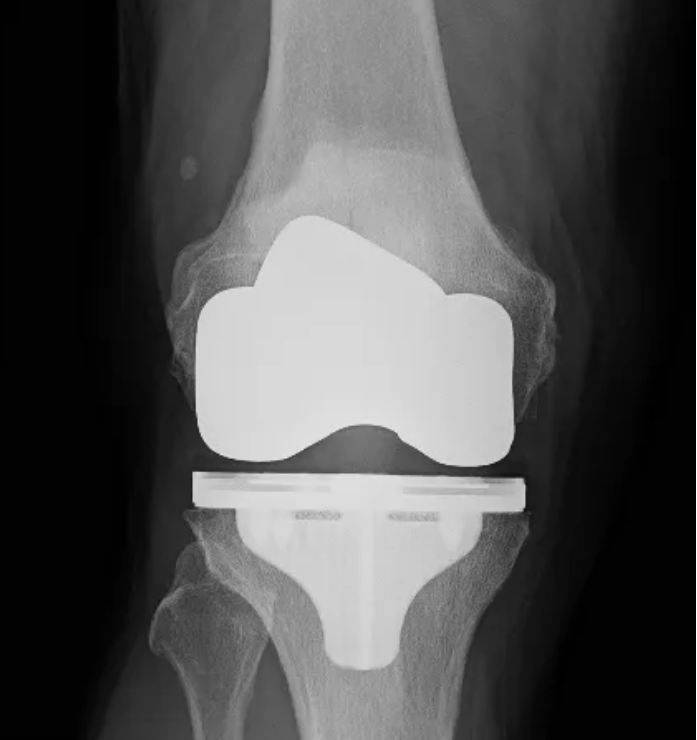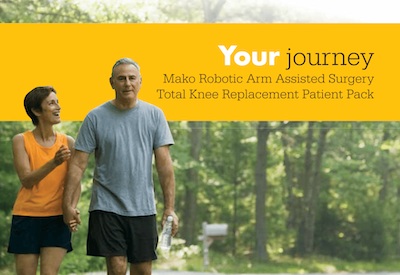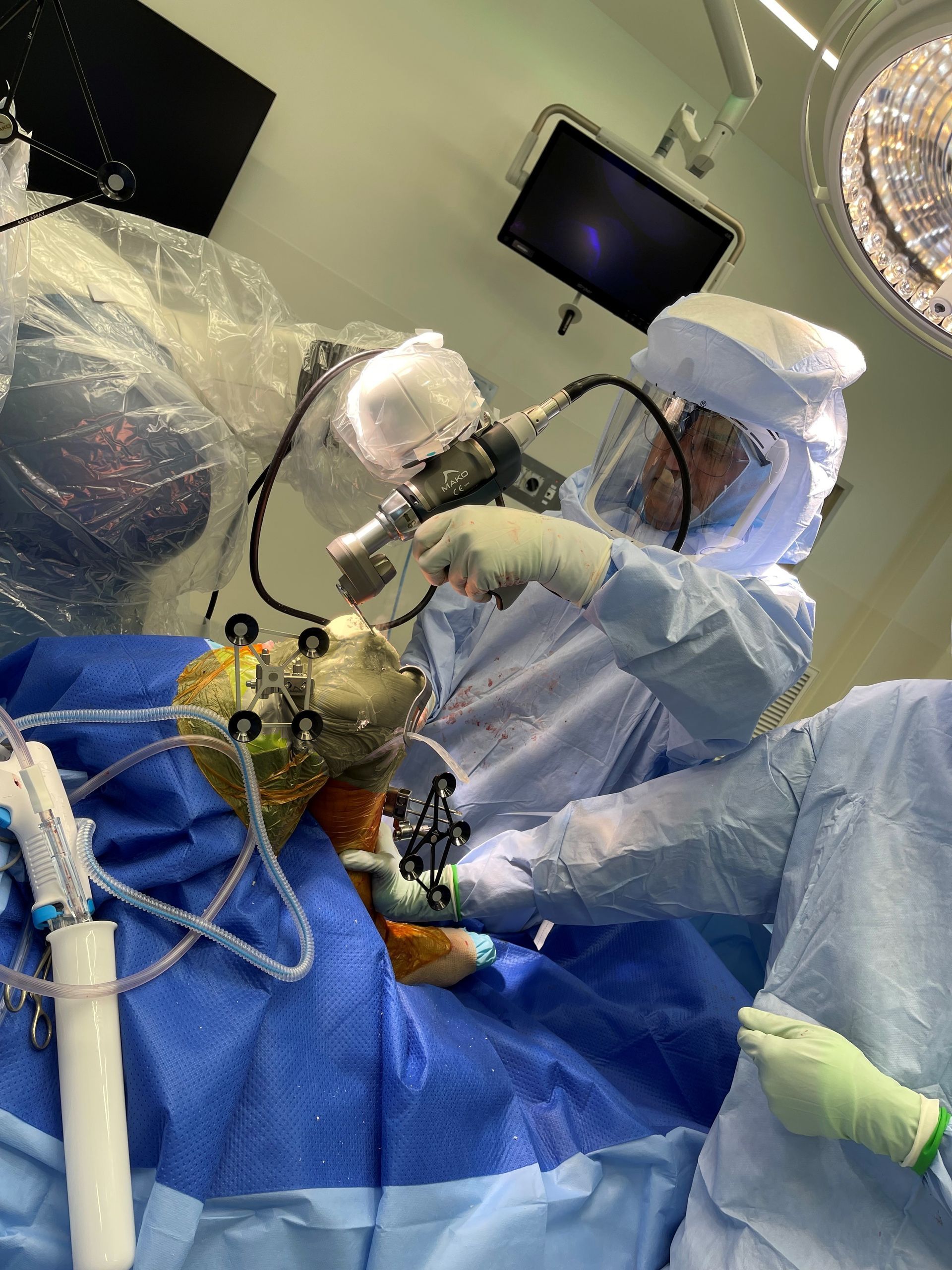Robotic Knee Replacement
What is a Knee Replacement?
A Robotic Knee Replacement, also called a Total Knee Arthroplasty, is an operation to replace a knee joint affected by arthritis.
It uses a robotic arm to assist the orthopaedic surgeon during the operation.
The robot is programmed to map the patient's unique anatomy and provide real-time feedback during surgery, allowing the surgeon to make precise and accurate cuts.
This advanced technology can help to improve the accuracy of implant placement and alignment, leading to better outcomes and faster recovery times. A new knee replacement can be expected to last for decades (90% are still functioning after 20 years).
Who are Candidates for Robotic Knee Replacement?
Robotic total knee replacement is suitable for patients experiencing knee pain and stiffness due to osteoarthritis, rheumatoid arthritis, and post-traumatic arthritis. The procedure is often recommended for patients who have not responded well to non-surgical treatments such as physical therapy, medication, and injections.
Patients with significant deformities, previous surgeries, or other complex medical conditions may not be suitable for robotic total knee replacement. Your orthopaedic surgeon will evaluate your case and determine if you are a suitable candidate for this procedure.
Benefits of Robotic Knee Replacement Surgery?
The decision to proceed with a TKR is a cooperative one between you, your doctor, your family and other medical professionals.
Robotic total knee replacement offers several benefits over traditional knee replacement procedures, including
- Improved accuracy and precision: The robotic arm allows for greater precision and accuracy in implant placement and alignment, resulting in better fit and longer-lasting results.
- Faster recovery times: Because robotic total knee replacement can be less invasive and more precise, it can theoretically lead to a faster recovery than traditional knee replacement procedures.
- Reduced risk of complications: The robotic arm provides real-time feedback to the surgeon, which can help reduce complications during and after the procedure.
- Customised approach: The robot is programmed to map each patient's unique anatomy, allowing for a customised approach to knee replacement surgery.
Often, TKR is a straightforward solution to help relieve symptoms and pain. Once the decision has been made to proceed with surgery, your doctor will explain the procedure and the risks. A date for surgery is usually planned but can be deferred.
Preparations Before Knee Replacement Surgery?
Once it is decided that surgery is required, preparation is necessary to achieve the best results and a quick and problem-free recovery. Preparing mentally and physically for surgery is essential for a successful outcome.
- You may need a referral for a CT scan. This scan should be done at least two weeks before surgery.
- A treatment plan will be created specifically tailored for you.
- You will be advised of the fasting and arrival times the day before surgery.
- Do not eat or drink anything, including water, for 6 hours before surgery.
- Stop taking aspirin or other anti-inflammatory medications or drugs that increase the risk of bleeding one week before surgery.
- Stop or cut down on smoking to reduce your surgery risks and improve your recovery.
- Eat a well-balanced diet, supplemented by a daily multivitamin with iron.
- Consider losing weight (if overweight) before surgery to help decrease the stress on the new joint.
- Treat any tooth, gum, bladder or bowel problems before surgery to reduce the risk of infection.
Report any infections to your surgeon before surgery, as the procedure cannot be performed until all infections have cleared up.
Robotic Total Knee Replacement Procedure
During the robotic total knee replacement procedure, the following steps typically occur
Step 1: Anaesthesia
The first step is administering anaesthesia. This can include general anaesthesia or a spinal block, which numbs the lower half of the body while the patient remains awake.
Step 2: Incision
The surgeon will make a small incision in the knee area to access the joint.
Step 3: Preparation of the Knee
The damaged parts of the knee joint will be removed, and the remaining bone will be prepared to receive the implant.
Step 4: Robotic Assistance
The surgeon will use a robotic arm to map the patient's unique anatomy and make precise cuts and measurements in real-time. This technology helps to ensure accurate placement and alignment of the implant.
Step 5: Implant Placement
The implant will be inserted into the prepared bone, and the surgeon will check its alignment and positioning using the robotic arm.
Step 6: Closure
The incision will be closed with stitches or staples, and a sterile dressing will be applied.
The procedure usually takes about 60-90 mins. Discharge home is usually on day 3.
After Your Knee Replacement Surgery,
You will typically spend several days in the hospital for observation and recovery. Physical therapy will be initiated to help regain strength and mobility in the affected leg. Pain management techniques will also be used to control discomfort during recovery.
Going Home After Knee Replacement Surgery
Remember to arrange for someone to take you home, as driving is not recommended for several weeks following knee replacement.
Return to Work
You may return to light work duties after 3-4 weeks. You will not be fit to perform work duties that involve:
- prolonged standing,
- heavy lifting,
- bending or
- excessive stair climbing
for a minimum of 6 weeks.
Post-Op Rapid Recovery Plan
The Total Knee Replacement Rapid Recovery Plan will assist you in recovering from surgery in the shortest time frame possible and the long-term function of your new knee.
The Rapid Recovery Plan is tailored specifically to you and will usually take about three months, and you can expect the knee to improve in 12–18 months. This scientifically based and proven medication regime for early post-operative comfort allows early mobilisation.
The physiotherapist will prepare an exercise programme. Much of the exercise programme can be done at home or a gym under your physiotherapist’s guidance.
- Use of the ‘Game Ready’ ice and compression machine post-operatively
- Use of an IV anti-inflammatory medication and local corticosteroids as indicated to assist with pain relief and recovery
- Early mobilisation and complete weight bearing
- Early transfer to a rehabilitation facility for more intensive physiotherapy
- Early hydrotherapy
Prognosis of Robotic Total Knee Replacement
The prognosis for patients undergoing robotic total knee replacement is generally favourable. The procedure has improved pain, mobility, and quality of life in patients with knee arthritis. Studies have also shown that robotic technology can improve implant placement and alignment, leading to longer-lasting results. We still do not know whether the increased precision and accurate bone preparation leads to long term benefits. Most knee replacements last 15-20 years now. If the robotic knee replacement lasts 30 years, it would be seen as a long term benefit.
However, the ultimate success of the procedure depends on several factors, including the patient's overall health, adherence to post-operative instructions, and the surgical team's expertise. About 5% of Knee replacements remain “unhappy” irrespective of the method of performing the procedure. Patients below 60 yrs of age,patients with obesity, patients with significant preoperative pain without much xray changes and patients requiring increased flexibility of the knee like electricians or plumbers find the knee may not quite reach expectations.
Robotic Total Knee Replacement Risks
As with any surgical procedure, there are potential risks associated with a robotic total knee replacement. These risks can include
- Infection,
- Blood clots,
- Implant failure,
- Nerve or blood vessel damage, and
- Allergic reactions to anaesthesia or other medications.
It's essential to discuss these risks with your orthopaedic surgeon before undergoing the procedure to ensure you have a clear understanding of the potential outcomes.
What if Total Knee Replacement is Delayed?
Some possible effects of delaying a Robotic TKR are
- Increased Pain and Discomfort,
- Loss of Function,
- Increased Risk of Complications,
- Delayed Recovery, and
- Impact on Quality of Life.
It is essential to consult with your orthopaedic surgeon to determine the best course of action if a TKR is delayed. Early intervention and treatment can help reduce pain and discomfort, prevent further joint damage, and improve outcomes following surgery.





